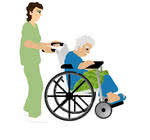
After being discharged from a hospital, seniors and their families not only have to worry about speeding up recovery through post-operation dieting or physical therapy, but they can experience a myriad of issues completely unrelated to physical health. Knowing what to expect when dealing with the American health care system, especially when the patient issuing Medicare, can ensure that your loved one has the best possible care under your supervision.
Understand how hospitals get paid when someone is on Medicare:
A major issue that many people do not understand is how hospitals get paid when the patient is on Medicare. Medicare is the primary healthcare for many people over 65 years old. Medicare alsodetermines the type of care and services a senior receives. Medicare pays money to hospitals on what is called a “case base.” This means the hospital will be paid one lump sum to provide treatment for the patient.
For example, when someone on Medicare falls and breaks their hip, Medicare pays the hospital a set amount for their treatment, regardless of how long or expensive the treatment is. This can put pressure on hospitals to discharge Medicare patients more quickly than they would in other circumstances.
Many hospitals actually lose 5% on average on the treatment of Medicare patients, and sometimes even more in rural areas. It’s important to separate frustration with this system from our dealings with hospital personnel, who did not create it, or, have any hand in planning it, unless you are dealing with a hospital administrator. Unfortunately, patients who are discharged too quickly from a hospital often return. If you feel your loved one is being discharged too quickly, there is an appeal process to prolong the stay. Essentially, the hospital cannot discharge a patient until the appeals board reaches a decision on the validity of the claim. For complete directions from Medicare on how to file an appeal, click here.
What is required from your hospital at the time of discharge?
Hospitals are required to provide detailed written instructions upon patient discharge, which ensure that the patient and/or the patient caregiver understand how to proceed upon release.You should make sure that you fully understand the discharge instructions before accepting discharge.
Also, you should not be afraid to ask the hospital to do more to help you with discharge planning. Many seniors will be discharged home before they are able to return to their normal routine and activity level. In those circumstances, discharging personnel at the hospital should identify family caregivers and services to be used before discharge. For example, in our fall scenario above, the patient with a broken hip will require rehabilitation care at either a residential care facility, a nursing home, or at their own home under the care of a home healthcare agency. Hospital social workers can help you find a provider in your area that meets your needs and is covered by Medicare. Many family caregivers do not feel comfortable arranging these services on their own, so don’t be afraid to ask for help. Before the patient is released make sure the services to be used, medications to be taken,and plan of action should are in place. Discharge planning is required byMedicare and JCAHO (The Joint Commission) who accredits hospitals.
Programs Available After Discharge:
Under Medicare, home healthcare is able to cover certain skilled nursing (usually 28 hours per week), physical, and occupational therapy services for those who are returning home, but cannot leave the home easily. Other services may be used, but these are the most common. Medicare covers these services for a limited amount of time, with a cap of $1,940 each for occupational and physical therapy in 2015. The time and cost are able to be extended if the therapist, nurse, or doctor deems it medically necessary to continue at the level of care being paid for. Skilled nursing provides a very high level of care and is meant to assist with rehab and recovery. Occupational therapy assists with daily life activities while physical therapy attempts to strengthen the body to where it was before the hospital stay.
Beyond home health, Medicare will usually pay for short-term respite care as well. Respite care is the temporary care of a medically dependent person in an institution, providing respite for the usual caregivers. Patients may need to pay 5% of the Medicare-approved amount for inpatient respite care.
Rather than suggesting that hospital discharge is typically difficult, this article is meant to highlight what to be aware of and what to expect after a hospital stay. For the most part, hospital staff aid discharged patients in a thorough and professional manner. Knowing both your rights and what is available in terms of care will hopefully allow you to take action if things are done improperly, putting the discharge back on track.
Max Gottliebis the content and web manager of Senior Planning. Based in Phoenix, Arizona, Senior Planning is a free service helping many Arizona seniors and their families navigate the process of long-term care planning.